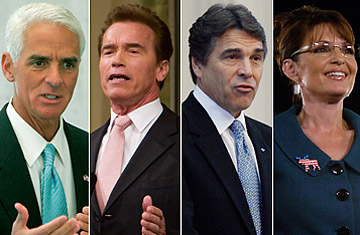
From left: Florida Governor Charlie Crist, California Governor Arnold Schwarzenegger, Texas Governor Rick Perry and Alaska Governor Sarah Palin
When President Barack Obama took his stimulus road show into Florida on Tuesday, Governor Charlie Crist was waiting, tapping his foot. Crist, a Republican, is actually six months ahead of Washington in the stimulus game: in August, in response to his state's economic implosion, he launched Accelerate Florida, which is pouring out more than $28 billion in stored-up state funds for the kind of infrastructure and school-construction projects that are still being debated inside the Beltway. (See pictures from the historic Election Day.)
At the time Crist announced Accelerate Florida, few if any fellow Republicans seemed to condemn the idea. And that makes it all the more curious to Crist and other moderate Republicans that now, when states' budget crises are even worse, conservative Republican governors in states like Texas, Mississippi, Louisiana and Alaska are following GOP leaders on Capitol Hill in adamant opposition to Obama's federal stimulus package.
"I see this package as a pragmatic, commonsense opportunity to move forward," Crist, who appeared with Obama in economically beleaguered Fort Myers today to tout the stimulus, told TIME on Monday night. "I didn't campaign for Obama, we don't agree on everything, but he's my President, and my job is to help Florida stay in the black." Introducing Obama at the town-hall meeting, Crist said it was not just important "that we support this stimulus package" but that "we do it in a bipartisan way ... It's about rising above" partisanship.
Crist's puzzlement at his colleagues' opposition reflects a fundamental divide in his party. If the stimulus debate has solidified Republican ideology in Washington, it has further exposed the party's fault lines at the state level — where many believe the GOP's future direction will be decided after the electoral disaster of 2008. For Crist and other moderate, bipartisan governors like California's Arnold Schwarzenegger and Vermont's Jim Douglas, backing the $800 billion recovery bill taking shape in Congress isn't just an act of economic self-interest; it also lets them showcase a less ideological conservatism that they insist voters want in the 21st century. For the camp that includes South Carolina's Mark Sanford, chairman of the Republican Governors Association, and Texas' Rick Perry, the legislation is a federal leviathan that lets them display faithfulness to the roots of the GOP as a Big Government slayer. "Rather than devote an unprecedented number of dollars to expanding government," Perry said last week, "they should stimulate the economy with something that actually works: tax cuts." (Read about what is a stimulus and what isn't.)
The split was first visible in November, just days after the presidential election, at the annual Republican governors conference Crist hosted in Miami. The centrists urged the party to obsess less about demonizing government and pressing hot-button social issues like gay marriage; the right wing warned that the party would all but vanish if it tried to be Dem Lite. But now the philosophical disputes are playing out in a high-stakes game of poker, with each side betting it will come out looking smarter when the stimulus' results are discernible. Should California and Florida, two of the states hardest hit by the nation's housing collapse, show improvement by the time the 2010 midterm elections roll around, you can probably expect to see the GOP running more from the center. Moreover, governors like Perry, who faces a strong challenge from Texas Senator Kay Bailey Hutchison next year for the Republican gubernatorial nomination, may look discredited. Should the stimulus fail, however, Perry — who reportedly had considered rejecting Texas' allotment of the federal aid once it passes — may have a much easier path to re-election.
Crist, who is also up for re-election next year — but won't comment on whether he's interested in the U.S. Senate seat that Florida Republican Mel Martinez is leaving in 2010 — has retained high approval ratings despite Florida's dire straits. He attributes them largely to the fact that "I don't come down on issues in terms of ideology." But that has put him at odds over the stimulus with most in Florida's GOP congressional delegation, including Martinez, whom Crist has lobbied hard in recent weeks to join the so far struggling bipartisan effort Obama is pushing in Washington. On the eve of Obama's visit to Florida — which Obama won in November — Crist was shuttling between calls to Martinez, urging him to come onboard a Senate bill that passed today, and meetings with his own Federal Stimulus Working Group in Tallahassee. That team is crafting a plan to inject the more than $13 billion in federal stimulus funds that Florida hopes to get from the House version — for roads, food stamps, green energy and the like — as quickly as possible into the peninsula's anemic bloodstream. (Crist knows the Senate version will give the state less, which is why he's also pushing, to little avail, Florida's GOP delegation in the House to back that chamber's bill.)
